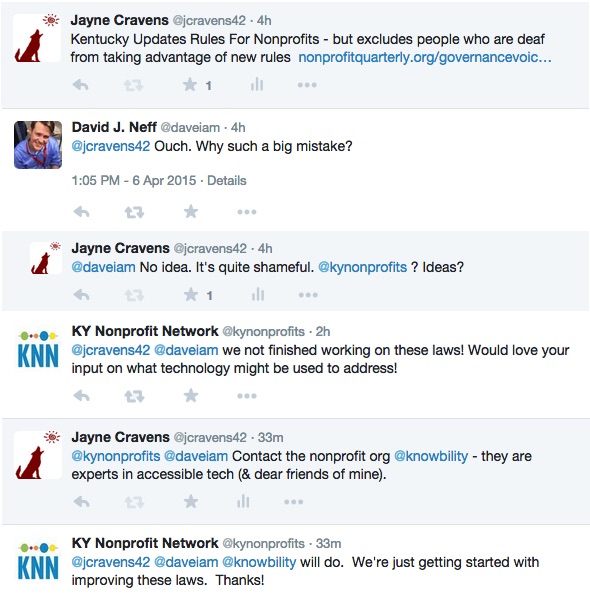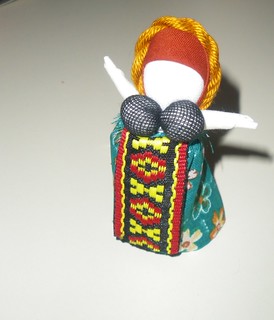I’m not fond of slacktivism (or slackervism). The word and its variations are a combination of the words slacker and activism. It’s a pejorative term that describes easy activities that make a person feel like they’ve made a difference for a group or a cause, like putting a bumper sticker on your car to “support the troops” or changing your profile photo on Facebook to show support for gay marriage, but the activity is more about making the person doing it feeling like they have contributed – but it doesn’t cost any kind of time, money or sacrifice on the person’s part, and probably doesn’t really affect the cause in any tangible way.
I’ve ranted about slacktivism a lot (see end of this blog for my other pieces on the subject), because I worry that people will choose to post a meme on Twitter that supports a cause they believe in rather than stand outside a grocery store to ask for signatures on a petition, or attend a rally, or staff an information table for a nonprofit at a community event, or donate money, or give substantial time to a political action committee or nonprofit trying to make a difference. I worry they think forwarding a message will end homelessness, stop female genital mutilation, provide mental health care services for veterans, feed hungry people, and on and on. I also I hate when people equate it with virtual volunteering; I have never considered it such, and I still don’t.
I stand by all my previous blogs ranting against slacktivism. But I’m now having trouble with exact definitions of it, because I have experienced, first hand, how posting memes and other messages to Facebook in support of a cause actually has caused someone to change their mind – and even voted differently as a result. There’s no absolute definition of who is and isn’t a volunteer, so I shouldn’t be surprised that the borders of the definition of slactivism have turned out to be so permeable.
I work very hard to keep my political views separate from my professional work. As I’m often in a communications officer position on behalf of a nonprofit, NGO, or government initiative, I often am not allowed to write letters to a newspaper or blog to express a point of view about current political affairs, or even just attend a protest rally. As a frequent consultant to the United Nations, I need to be perceived as politically neutral and respectful to those with whom I’m working, and I work hard to meet that requirement. As a result, many people I work with have no idea just how politically active I have been. None. This comes as a massive shock to my friends who know me outside of work, who know that I’m quite passionate about many issues, and that I’ve been an activist for many causes, long before the Internet, when I’m not in a communications officer position: I’ve worked to register voters, written and edited a newsletter for a group working to promote women’s right to abortion services, and spoken on behalf of political candidates I’m supporting. My friends have seen me VERY angry over various human rights issues, and act out on that anger, and can’t believe I can turn that button off so easily in certain circumstances.
Sometimes, through my activism, I’ve changed minds. Sometimes, my words have caused me to lose friends. I don’t know of an effective activist who hasn’t made people angry, no matter how hard they may have tried not to, no matter how much they’ve stayed away from anything that would seem personally insulting and tried, instead, to stick to education and patience. I’ve had my life threatened or put into danger twice because of my activism. Being an activist comes with costs that can be painful to pay.
Per several shootings in the USA of unarmed black Americans by white police officers, several online campaigns started, such as tagging posts on Twitter and Facebook with #blacklivesmatter. The tag was used by many people who have been on the streets and in community meetings and at political events, spending many hours to bring to light the very real, justifiable fear black Americans – particularly black American men – experience in encounters with the police. The tag was also used by people who’ve never done any of that kind of activism at all, as a way to show their support and outrage. That lead to some arguments online: should people who have not been traditional activists, should people who have never marched or attended meetings or put in the hours for the cause, should people who are white and would never experience the kind of fear and persecution so many black Americans experience regularly, use the tag? And white people using the tag – shouldn’t they do MUCH more, like march, register voters, write their elected officials, donate money to organizations working long-term on these issues, etc.?
Per the recent Supreme Court decision saying that all adults have a right to marry, including couples of the same sex, millions of people changed their Facebook profile photo to show a rainbow filter over the image, as a way of expressing support for the decision. And most of these people who did this are straight and have never done any traditional activism in support of gay rights: they’ve never stood outside a grocery store getting people to sign petitions, they’ve never marched in a rally, they’ve never donated any money to an organization working for gay rights, etc. In fact, they may never have told anyone before that they supported gay rights. That’s lead some posts online deriding straight people for their attempt to be gay allies – including a very angry direct message to me from a friend who seems to think that’s all I’ve done on behalf of gay rights. Others praised “straight allies”.
The underlying messages of these criticisms of white allies for #blacklivesmatter and for straight allies of gay marriage is this: you haven’t suffered for this cause, you haven’t worked for this cause, you haven’t sacrificed for this cause, you aren’t really a part of this cause, you shouldn’t get to celebrate a victory or be counted among those supporting the cause – and using a tag or a photo filter is just slacktivism.
I understand that criticism, I do. I understand what it can feel like when you work hard for something, you sacrifice, you experience hardship, and at a victory, people you’ve never seen alongside you in the trenches are there for the celebrations. I understand what it’s like to be an activist on an issue that is VERY personal to you, and to work with people who are supportive but who cannot experience the issue the way you do – men at an organizing meeting to support abortion rights, people of faith defending their atheist friends – and to wonder, can they ever really understand this?
But consider that some of those people who have never said a word on Facebook or Twitter or at the family dinner table or even to you about these causes before, and then have then dared to post a meme about Ferguson or Baltimore or Cleveland or anywhere else there has been a shooting of a black American by a white police officer, or have changed their profile to the rainbow filter, have suddenly received very hurtful comments – some of it quite public – from family, friends, neighbors and work colleagues. And some of them have received direct messages from family, friends, neighbors and work colleagues saying, “I’m so glad you posted that. I agree – but I can’t say anything because I’ll make too many people around me angry.” And some of them may have started to changed the mind of someone that a regular, traditional activist NEVER could have reached – a friend, a family member, a neighbor, a work colleague, who is surrounded by only one kind of messaging, and here is someone they know and trust and maybe even love, making this simple, challenging statement in opposition to what they believe. I’ve gotten private messages from three people who said my private, friends-only posts on a personal account on an online social network changed their minds about who to vote for in an upcoming election. I’ve had friends and family members write me private messages saying they can’t be so vocal, but they agree with me – and it’s been shocking who these messages have been from – I never would have guessed those sympathies in many cases. I’ve never had anyone tell me that in those long hours standing at an information booth on a hot day at a community event – though I like to believe it’s happened.
So I’m going to start being a lot kinder about what I brand as slacktivism. I might even be willing to consider it microvolunteering in some instances. But mostly, I’m not going to play the more-activist-than-thou game I see so many playing. The world needs all kinds of activism and activists, and I’m going to welcome them all.
And I’ll always be thankful for every activist, every ally, for every cause.
See also:
- Ugh – Slacktivism (I still don’t like it)
- Slackervism on Facebook again
- learning from a campaign that went viral
- Do online petitions work?
- Anger motivates volunteers as much as sympathy
- Taking a stand when you are supposed to be neutral/not controversial
- Why You SHOULD Separate Your Personal Life & Professional Life Online




